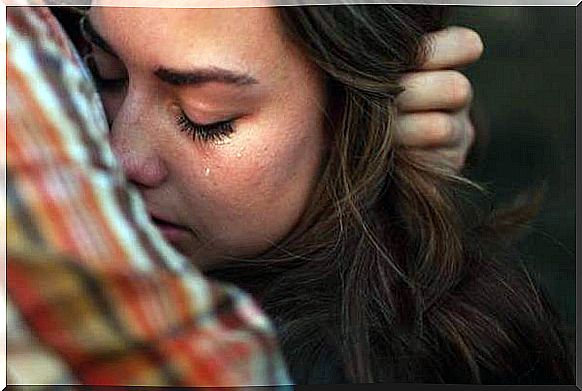Culture Of Victimhood: When Emotional Blackmail Becomes A Way Of Life

All of us at some point in our lives have assumed the role of victims in painful or traumatic situations, since we feel vulnerable and unprotected and we need to be cared for and protected. The culture of victimhood reinforces this by making the person who assumes the victim role feel accompanied.
When we have experienced the care and protection of the people around us, we discover that it is pleasant to feel the attention of others, that we like the feeling of being the protagonist of our environment and that they are constantly watching us.
It happens that some people take this role as an identity, they become chronic victimizers. This identity is covered by the culture of victimhood in which we find ourselves: it is well seen to help those in need, even if it means losing oneself. On the contrary, not offering help is negative social criticism.
It should be noted that chronic victimhood is not in itself a condition classified in the DSM-5, although it could lay the psychological bases for developing a paranoid personality disorder.

What is the victimist role in the culture of victimhood?
Continuous reinforcement
Although it is true that when we assume the role of victims it is due to a feeling of discomfort, there are certain people who turn that role into a lifestyle, what is the reason for it? What prompts someone to recreate their discomfort?
The answer is simple: reinforcement and continuous attention. The reinforcement that occurs when a person is a victim leads to entry into a “continuous loop.” I feel bad, they reinforce my role, so I allow myself to stay in that role.
The culture of victimhood: the role of society
Society plays a key role. According to Giglioli, an expert in comparative literature and author of the Critique of the Victim, victimhood is a cultural addition to the social laws that govern our culture. The culture of victimhood comes to say that showing up in the role of victim is well seen socially, since the fact of helping those in need is valued in a positive way.
In the culture of victimhood there is a certain tendency to reinforce that victimizing role, of “poor thing”, “he has no one”, “How can I not help him if he is my mother?”, “You are a bad son for leaving her alone.” All this coupled with the fear of what they will say “they are going to say that I am a bad person, what will they think of me if I do not help them?”.
External locus of control
Victimists really believe that everything that happens to them is the fault of others or of circumstances. They think that “I have very bad luck”, “everything happens to me”. This is what is known as an external locus of control, where responsibility for actions is not assumed as one’s own. On the contrary, this responsibility is attributed to factors outside and external to themselves.
Victimism and negativism
Victimists tend to exacerbate what happens to them, generating an even greater sense of gravity in relation to what is happening, which prevents them from seeing the positive side. They are completely focused on the negative, so much so that the good goes unnoticed. Consequently, their strategies for coping with problems are wrong, which prevents them from proposing different alternatives, possible solutions to their difficulties and taking control of their lives.
Emotional blackmail as a form of communication
Chronic victimizers try to manipulate the people around them to achieve their goals. For this reason, they tend to easily recognize the most empathetic people who are their main focus, using that empathy for their own benefit to obtain what they want.
When that person does not do what they expect, they place them in the role of executioner and themselves as victims. They use phrases such as “with everything I’ve always done for you and that’s how you pay me”, “you leave me alone”, “if you don’t do it, it’s because you don’t love me”, which causes feelings of guilt in the person who receives those messages. In short, they try to carry out what they want through emotional blackmail.

How do I act if I find myself in front of a victimizing person?
-
Not giving him what he wants, as it reinforces the victimizer to continue in his role and if the people around him continue to do “more of the same”, it causes it to continue to happen. Continue caring for and offering care that seeks, increases and / or maintains the victim’s response.
-
Explain to the chronic victimizer the reasons you are changing your behavior to help him get out of his comfort zone. In such a way that the victimizer understands the reasons why this change occurs in you and the benefits for him or herself. “Not helping you, not giving you what you want, is when I really help you.”
-
Maintain emotional distance. Being surrounded by such negative people wears you down and to protect yourself it is important to maintain limits, since we and our own well-being are also important.
-
Propose possible alternatives to their behavior : “What can you do differently from what you have done so far?”, “What part of the responsibility do you have?” Are you willing to assume that you have an active role in what happens to you and not everything is the result of bad luck or of others? “
-
Don’t get overly involved if that person doesn’t want to change. Remember that “for another to be better, I cannot sacrifice myself.” It is important to offer our understanding and affection, but that this does not mean sacrificing our well-being.
-
You are not guilty. Guilt is one of the main weapons of the victimizer, so it is common to feel guilty for not satisfying that person’s wishes. Remember that he is using your guilt to get what he wants.
-
Use the “no.” When you are unwilling to do something, say no politely, clearly, and firmly. Don’t make too many excuses, as the victimizer can use them against you.
-
Urge you to seek help from a professional. In the face of chronic victimizers, psychological assistance from a specialized professional who can really help you is recommended.
As we can see, the culture of victimhood leads us to renounce many times our desires and needs in order to help others. It is important that we are aware of this to protect ourselves and promote change in the person who assumes the role of victim.









